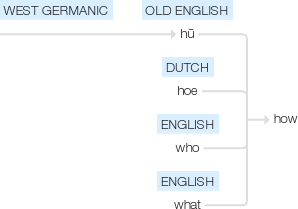How
Old English hū, of West Germanic origin; related to Dutch hoe, also to who and what.
wiktionary
From Middle English how, hou, hu, hwu, from Old English hū, from Proto-Germanic *hwō, from the same root as hwæt(“who, what”). /hw/ > /h/ due to wh-cluster reduction in Old English; compare who, which underwent this change later, and thus is spelt wh (Middle English spelling of /hw/) but pronounced /h/ (it previously had a different vowel, hence avoided the spelling and sound change in Old English). Vowel change per Great Vowel Shift.
Akin to Scots hoo, foo(“how”), Saterland Frisian wo(“how”), West Frisian hoe(“how”), Low German ho, wo, wu(“how”), Dutch hoe(“how”), German wie(“how”), Swedish hur(“how”). See who and compare why.
From Middle English howe, hough, hogh, partly from Old English hōh(“promontory”), and partly from Old Norse haugr(“a how, mound”). Compare Old French höe(“hillock, hill”), from the same Germanic source.
From a Siouan language; compare Lakota háu. Alternatively from Wyandot haau.
etymonline
how (adv.)
Old English hu "how," from Proto-Germanic *hwo (source also of Old Saxon hwo, Old Frisian, Middle Dutch hu, Dutch hoe, German wie, Gothic hvaiwa "how"), an adverbial form from PIE root *kwo-, stem of relative and interrogative pronouns. Practically a doublet of why, differentiated in form and use.
How come? for "why?" is recorded from 1848 [Bartlett]. Emphatic phrase and how! is recorded from 1865. The formulation was common in book and article titles ("The National Debt, and How to Pay It"), but Pennsylvania writer Bayard Taylor, in whom it is first recorded, seems to have regarded it as a German or German-American expression.
how (interj.)
Native American greeting, Siouxan (Dakota hao, Omaha hau), first recorded 1817 in English. But according to OED, the same word was noted early 17c. by French missionary Jean de Brebeuf among Hurons as an expression of approval (1636).
